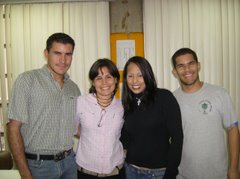In ELT, it is essential to resort to whatever effective method available to acomplish the task of conveying meaningful learning. One of this methods is the use of literary works in which one can find situations similar to the ones found in reality, so that they might be discussed for developing a critic view in the learner.
Here is part of an essay related to Isaac Asimov's The Bicentennial Man, which is a novel and short story easy to read but still full of meaning.
The story begins when Andrew Martin (an android) is in an operating room talking to a robot surgeon who cannot really determine whether Andrew is a robot or a human being. This situation arose because apart from having a humanlike appearance, Andrew was able to give orders when the only ones who could do it were human beings. Thus, it was this unique feature what made Andrew a little more human, he even asked the surgeon “It does not offend you that I can order you about? That I can make you stand up, sit down, move right or left, by merely telling you so?”. It is clear then, that Andrew’s view of ‘being human’ was a matter of being aware of its existence, a sort of superiority similar to the one humankind exerts over animal life; superiority that allows the former to control the latter.
In time, Andrew developed prostheses that replaced one by one his internal works for artificial organs with the exception of the brain. Those organs were so similar to the ones human beings have that people transplanted them whenever they need to replace a kidney, a heart or whatever sort of organ they needed. Andrew then, being a “human de facto” –“treated as a human being by robots and human beings”–, wanted to become a “human being de jure”. That is the reason why he started a series of pleas in the world court that “established the fact that no number of artefacts in the human body causes it to ceased being human body” leaving the brain –organic cellular for human beings and platinum-iridium positronic for robots– as the only difference remaining between mankind and robots.
The point was that cells ceased functioning, but positrons were everlasting and mankind would never accept an immortal human being, “since their own mortality is endurable only so long as it is universal” not particular. The issue was then solved when Andrew arranged to cease functioning through the operation above mentioned at his two-hundredth anniversary, being then declared a bicentennial man just before his departure. It is possible then to notice how mankindness was defined as rational beings in control, evolved to those who can be free, continued with the ones who have an organic cellular brain and finally, those who die.
The story of the Bicentennial Man can be thus classified as Science Fiction because of the effects that the development of robotics had on the society present in the account, which had to create new laws and social rules to cope with the new issues that Andrew gave rise. The encyclopedia Encarta (2006) remarks that idea when it states that Science Fiction deals with the particular and general effects that scientific changes have on people and society.
In this portrayal of reality, Isaac Asimov also depicts human fear of machines in a satirical way. For example, when the bullies attacked Andrew, George stopped them by assuring them that Andrew was going to fight back –though it was impossible for Andrew due to its first law– which was enough to make them run away; Andrew even wondered “How can they fear robots?”. Later on, the same aspect is highlighted when the Congress people were still suspicious of robots –they had “the fear of setting an undesirable precedent”– suspicion to which Andrew asked “Even now? He was clearly puzzled by this unfounded human fear.
Sunday 24 June 2007
Subscribe to:
Posts (Atom)

